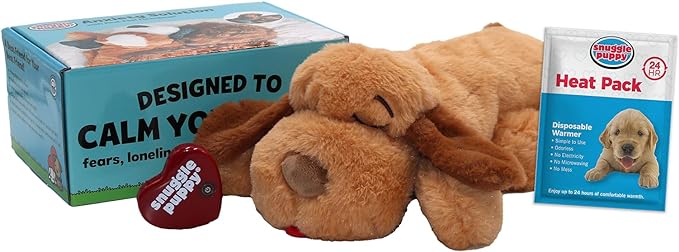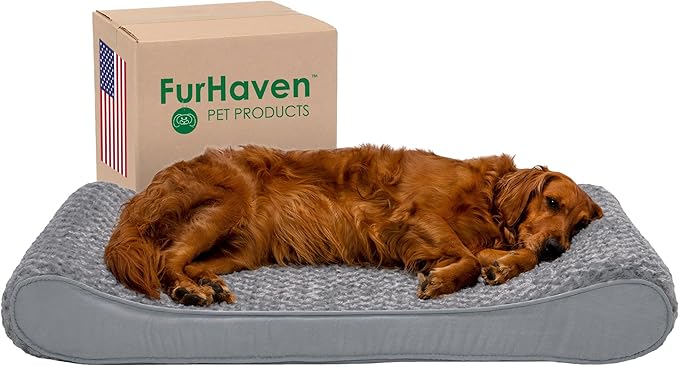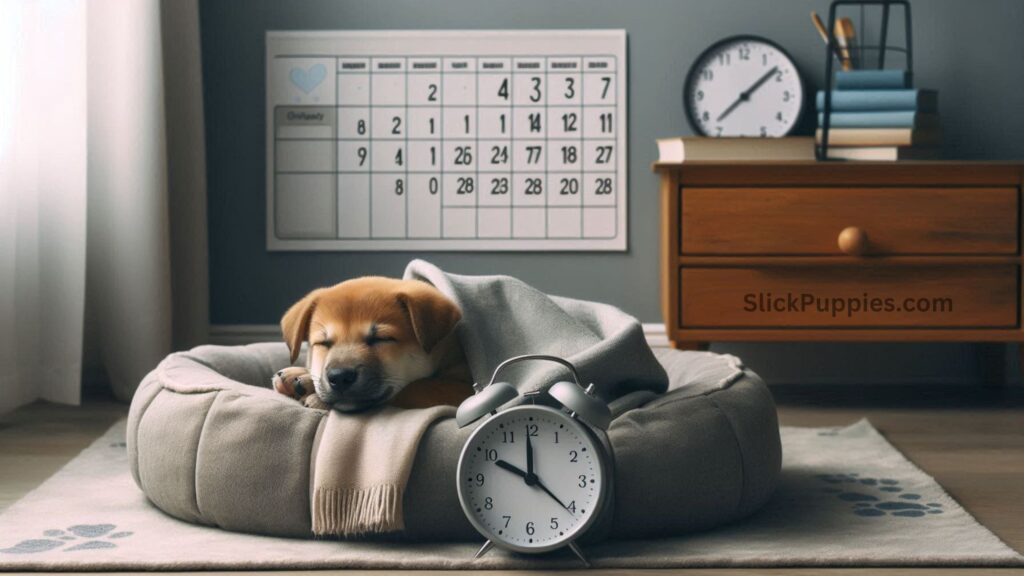So, you adopted a puppy—congrats! Get ready for months filled with joy, love, and excitement… along with a few sleepless nights. It’s your job to help your new pup settle in and set them up for success. The secret to getting your puppy to sleep through the night is all about creating a routine, sticking to a schedule, and managing their feeding and water times.
Keep reading for our trainer-approved tips and insider advice from experienced pet parents. With a little help from us, you’ll go from waking up two or three times a night to enjoying peaceful, uninterrupted sleep—both for you and your pup!
How Long Do Puppies Sleep For?
Puppies sleep a lot. On average, they snooze anywhere from 10 to 18 hours in a 24-hour period. A good chunk of this happens at night, but their age plays a big role in how long they’ll actually stay asleep. Most puppies won’t sleep through the night until they’re around 16 weeks old. A study from 2020 found that puppies at this age slept about seven hours straight at night.

But here’s the catch: most people bring home puppies when they’re just 9–10 weeks old. That means you’re looking at 6–7 weeks of interrupted sleep ahead. Don’t worry—you’re not alone in this! It’s a challenge, but you’ll get through it. Here’s how:
1. Be Patient with Your Pup
The first night might not set the tone for what’s ahead. Some puppies are shy and need time to adjust to their new home, while others might sleep like logs for the first few days out of sheer exhaustion—only to start waking up at all hours afterward.
Reasons your puppy might not sleep well right away include:
- Missing their littermates.
- Feeling unsure about their new home and family.
- Worrying about accidents in their sleeping space.
- Being too excited or restless because they lack a routine.
Give it time! Most puppies adjust to sleeping alone—and through the night—by about 16 weeks old. Patience and positivity will make this transition much smoother.

Original Snuggle Puppy Heartbeat Stuffed Toy
The Original Snuggle Puppy Heartbeat Toy comforts dogs with a soothing heartbeat and warmth, reducing anxiety and promoting relaxation for puppies and adults.
2. Establish a Bedtime Routine
A consistent bedtime routine is key. Start by removing food and water a few hours before bed, then wind things down with calming activities. Dim the lights, play some soft music, and make sure your puppy has a cozy nest to snuggle in. Toss in an old shirt of yours to comfort them with your scent.
Stick to one sleeping spot—like a crate—and avoid switching things up too much. If your puppy is anxious or afraid of missing out, sleeping near their crate for the first few nights can help.
Pro tip: Try using a Dog Appeasing Pheromone (DAP) collar or diffuser. These release a calming scent similar to what a mother dog produces. Toys with a “heartbeat” feature can also work wonders.
3. Try Crate Training at Night
Crate training may seem like a hassle, but it’s worth it in the long run. At night, encourage your puppy to choose the crate by rewarding them when they go inside.
Benefits of nighttime crate training:
- Structure and routine: The crate signals bedtime.
- Fewer accidents: Puppies in crates are more likely to alert you when they need to go out.
- Flexibility: Once your puppy is used to their crate, you can move it wherever you need.
Covering the crate can also help by blocking out distractions. Some puppies calm down when their crate feels like a cozy den.
Pro tip: Choose where your puppy will sleep and stick to it. If it’s the living room, sleep nearby for the first few nights and gradually move away.

ADAPTIL Dog Calming Pheromone Diffuser
The ADAPTIL Dog Calming Pheromone Diffuser reduces stress and anxiety in dogs by mimicking natural calming pheromones, promoting relaxation in stressful situations.
Also Read: How to Potty Train a 2-Month-Old Puppy?
4. Tire Them Out During the Day
A tired puppy is a sleepy puppy. Even if they’re not fully vaccinated yet, there are plenty of ways to wear them out at home or in your yard.
Physical activities:
- Tug-of-war or chase games.
- Gentle flirt stick play.
- Recall games (teaching “come here”).
- Focused yard laps once leash-trained.
Mental exercises:
- Training sessions for basic commands.
- Puzzle toys.
- Sniffing games or “decompression” walks around safe areas.
- Watching the world go by (with treats for calm behavior).
Pro tip: Make their sleeping area as comfy as possible—add a soft blanket or a shirt that smells like you.
5. Respect Their Potty Schedule
Before bedtime, make sure your puppy has time to do their business outside—5–10 minutes should do it. Puppies usually need to go 20–30 minutes after eating, so plan accordingly.
Cut off food and water at least an hour before bed, but a little sip of water or an ice cube in their bowl is fine to prevent thirst.
6. Plan for Midnight Potty Breaks
For the first few weeks, set a timer for a middle-of-the-night potty break (4–5 hours after bedtime). Don’t wait for your puppy to wake you—they might end up whining or having an accident. Keep the outing calm and quick so they stay sleepy. As they get older, you can gradually push this time closer to morning.
7. Ignore the Whining
If your puppy has already gone potty and is just crying for attention, ignore it. Puppies are smart, and if they learn that barking brings you running, they’ll keep doing it. Use earplugs or white noise to block out the whining during the first few nights.
Sleeping near them with your hand by their crate might also help ease their anxiety without giving in to the whining.

Furhaven Orthopedic Dog Bed
Furhaven Orthopedic Dog Bed provides plush comfort with ergonomic support, featuring soft bolsters, orthopedic foam, and a removable, washable cover for easy care.
8. Adjust Your Expectations
For young puppies, “sleeping through the night” might mean waking up at 5 or 6 a.m.—bright-eyed and full of energy. It’s normal! Over time, they’ll sleep longer, but for now, early mornings are just part of puppy life.
If you want to sleep in, consider leaving a pee pad in a larger space so they can relieve themselves without waking you. Just be aware that accidents might still happen if they’re not potty pad-trained.
With a bit of patience, consistency, and a solid routine, you’ll get through these sleepless nights. And before you know it, your puppy will be snoozing soundly—and so will you!
Also Read: What is the Best Puppy Shampoo for Sensitive Skin?
What Age Will My Puppy Sleep Through the Night?
If you’re following all these tips, you’re doing great! Most puppies start sleeping through the night by the time they’re three or four months old. With a consistent routine for exercise, feeding, and bedtime, you might even see progress sooner. By six months, those middle-of-the-night potty breaks will be a thing of the past.

Let’s be real, though—those first few weeks can be rough on your own sleep schedule, especially if you’re not a morning person. But don’t worry, your puppy will eventually learn to sleep in (that’s a whole other training adventure). The good news? Dogs need plenty of sleep, so you might even sneak in a nap while your puppy is snoozing too!



